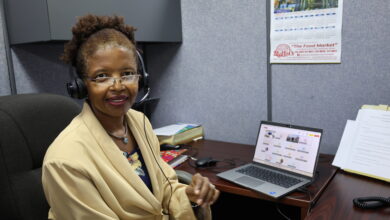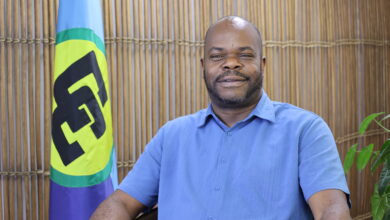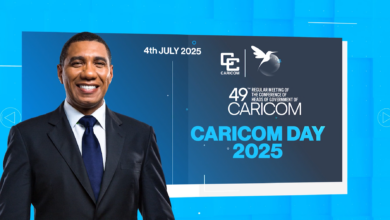Honourable Ministers of Government
Excellencies
Members of Parliament and the Senate
Other Distinguished Guests
CARICOM Nationals
Ladies and Gentlemen
I want to thank my friend and colleague Ambassador Bullen for his very kind introduction indeed as I do for the invitation to be here. Ladies and Gentlemen I am sure you are all aware of the saying “third time” lucky but after being unable to accept invitations to attend the first two years of this celebration, I felt that it may more be a case of “three strikes and you're out,” so that if I did not turn up this year – no more invitations. Therefore when my good friend Ambassador Bullen issued the invitation, I hastened to assure him that regardless of the difficulties I would encounter – and believe me there are difficulties with my leaving Georgetown at this time with the major annual meeting of the Heads of Government scheduled in two weeks time – I would not miss this year's celebrations and take advantage thereof as regards your valuable input to that very important meeting . Thank you, therefore, so very much for having me.
Excellencies I am truly honoured and privileged to be here with you, the High Commissioners of the countries of the Caribbean Community, to celebrate our achievements as a Community with this CARICOM Day Reception. I want to congratulate you on this effort which I believe is virtually unique among our overseas representatives. One hopes that others will follow your pioneering efforts. This recognition of ourselves as a Community is an important factor, not only in terms of how we see ourselves as a people, but also in our relationship with the rest of the world. The more we see ourselves as one Community rather than as separate States and the more we act as such, the more the rest of the world will see us as one and the greater will be our impact on the global stage.
The single Caribbean Community does have many parts and in that regard today we should, as reminded by Ambassador Bullen, pay special tribute to that sub-regional unit of the Caribbean Community – the Organisation of East Caribbean States (OECS) – which celebrates its 21st anniversary tomorrow. Formed in 1981 to promote co-operation and economic integration among its Member States and to assist them to meet international obligations and foster common action on issues of shared concerned, the OECS is now a nine-member grouping of which all members full and associate belong to the wider Caribbean Community, CARICOM. With its single currency, single Central Bank and a regional judicial system, the OECS represents in many ways, the vanguard of the Caribbean Community. We wish them heartiest congratulations on their 21st anniversary.
Our celebrations today could hardly have been held in a country historically more supportive of our efforts at integration. Quite apart from its generous assistance to the development of our individual Member States, Canada has a long history of tangible assistance to manifestations of Caribbean unity.
I need not remind you that the relationship dates back as far as the late 17th century, with the export of staples (remember salted Cod) to our Region from the Maritime Provinces. Since 1912 our two regions began entering into formal trade arrangements allowing for the movement of goods between Canada and most of the British West Indies at preferential tariff rates.
This was followed in 1925 by the Canada-West Indies Trade Agreement allowing for the first time all the countries of the British West Indies, as well as British Honduras now Belize to enjoy lower tariffs on a significantly increased number of goods. Interestingly enough, also included as part of the 1925 Agreement was a protocol establishing a Commonwealth Caribbean-Canada Trade and Economic Committee to Consult on Trade, Financial and Related Matters, a clear precursor to our present-day Joint Trade and Economic Committee (JTEC).
The one major Regional political initiative – the West Indies Federation of 1958 – also won the support of Canada in the form of the donation of two ships, the Federal Maple and the Federal Palm, to facilitate travel among the Caribbean countries. Relations between the two regions entered a new and higher phase when in 1966 here in Ottawa the first Summit of CARICOM and Canada leaders took place. Later in 1979, by which time the Caribbean Community and Common Market had been established, Canada and our Community signed the Canada-CARICOM Trade and Economic Agreement under which the Government of Canada provides support (both human and financial) for key regional programmes and projects which contribute to the Region's economic and social development.
Among these programmes and projects have been the establishment and operations of the CARICOM Fisheries Resource Assessment and Management Program (CFRAMP) located in Belize; the five-year CARICOM Regional Institutional Strengthening Project (CRISP) for the CARICOM Secretariat geared to upgrading its capacity and efficiency and in a matter of life and death – for that is what it is – there is a six-year CAREC HIV/AIDS Project (CHAP) for screening and testing for HIV which began in 1996.
Since 1963, Canada is estimated to have provided to the Region, close to (Can) $2 billion in development assistance, in addition to its contribution as a founder member of the Caribbean Development Bank (CDB) [which has grown from a capital injection of (US) $11 million in 1970 to close to (US) $120 million in 2001. ] Little wonder then that this relationship, which has been one of the most enduring of all our external relationships, has come to be characterised as 'Special'.
But the world is changing and it seems set to bring changes to the Canada/CARICOM relationship. As you know our Caribbean Community is currently involved in a number of negotiations including for the Free Trade Area of the Americas ( FTAA), in the World Trade Organisation (WTO) and with the European Union. The Caribbean Regional Negotiating Machinery (RNM) is spearheading these efforts and a key component of our approach has been to seek recognition of our position as small and vulnerable states. In that struggle, Canada is also one of the countries which has supported the principle of special treatment for the smaller economies. We hope that other influences and pressures would not lead Canada to withdraw its support for that principle.
A notable feature of the changes being experienced by the Region in its relations with Canada relates to its trading position. Although under the Caribbean/Canada Trade Agreement (CARIBCAN) – the economic and trade development assistance programme established in 1986 – and the Generalised System of Preferences (GSP), a significant share of our exports to Canada enters duty-free, a look at the trade figures up to the year 2000 reveals that the balance of trade has shifted dramatically from a positive balance for the Caribbean Region of some US $4.7 million (EC $12.75 million) in 1996, to a negative balance, (that is, one in favour of Canada,) of approximately US $88 Million (EC $239 million)in 2000.
Even if the trade in services were taken into account, as the Canadian High Commissioner to Guyana H.E Serge Marcoux recently urged during a speech to the Essequibo Chamber of Commerce and Industry, there is no certainty that the overall trade balance would have been any better from a Caribbean point of view.
The above is by no means an exhaustive list of the economic and financial relationship between our Community and Canada. It is however not my intention this evening to so set out as I am sure you would recall the comprehensive statement given last year by my distinguished Deputy Secretary-General.
There are however certain other significant areas deserving of mention, such as direct foreign investment, in particular in banking and mining, from which both Canada and CARICOM have benefitted and also the contribution through remittances by the diaspora in Canada to the Region. These have both been important elements in the economic life of our people.
Even more importantly, however, there is a beneficial relationship which goes beyond mere dollars and cents and carries with it significant reciprocity. Our most precious resource has been flowing to Canada and has been deeply involved in developing this nation. Thousands of our trained and skilled workforce have made Canada their home and contributed their skills and training to their adopted country. So far as regards valuation, no one has come up with a feasible method of quantifying the value of this “export” – neither its cost to the exporting countries nor its worth to the receiving ones. We know that millions of dollars invested by the Caribbean Community in developing skills and providing training to further our development agenda have redounded to the benefit of other countries, Canada included. It may be argued that there are limited opportunities in the Caribbean and incomparable financial returns and working conditions for such skilled personnel in the more developed countries. Even if this were so, as indeed it often is, a case still exists in the face of major national recruitment drives especially by developed countries, for our countries to be compensated by some sort of capital grant resources to enable them to train replacements.
It is a matter which is serious enough and is felt in some quarters in the Region that it should be considered by the G-8 countries, given the significant number of skilled personnel currently being recruited from our already human- resource-depleted societies. This is another area in which Canada and CARICOM can co-operate to their mutual benefit. Within the G-8 forum, which Canada currently chairs, it can, in keeping with its undertaking to the Caribbean Community, put forward CARICOM's concerns in this regard in the hope that they would be factored into that Group's considerations.
Another critical area for co-operation between Canada and the Caribbean Community relates to Haiti, one of the two major French-speaking communities in the Western Hemisphere. We look forward to Canada's help particularly in the hemispheric process of assisting Haiti in its social, economic and political development efforts. Specifically as regards the G-8 it is our firm hope that Canada will use its great influence to get support for Haiti to gain access to the funds – some already approved – it so desperately needs from the international financial community. It is our view that this historical trail-blazing nation, which is soon to be a formal member of CARICOM ought to be given every support to pull itself up out of the quagmire of underdevelopment that has bedevilled its history.
To deny Haiti those funds after the Government had done its part in meeting the many conditions set by the international community is unjust and indeed inhumane. Have no doubt about it, the call for adherence by Haiti to the principles of good governance is also supported by the Caribbean Community. But we are also painfully aware that without access to the necessary resources, the government's hands are tied in so far as implementing practical measures to shore up the struggling democracy is concerned. It is in this context that CARICOM has appealed to the Friends of Haiti and the wider international community to recognise the need to move without further delay in obtaining those desperately needed resources, on behalf of the struggling, impoverished people of Haiti.
Excellencies, ladies and gentlemen, as special a friend as Canada has been to us, in the final analysis, it is what we as a Community do to help ourselves that will make the decisive difference. That is why our effort to deepen integration through the early establishment of the CARICOM Single Market and Economy, including most crucially our Caribbean Court of Justice, is so critical and urgent. The prospect of a single economic space in the Community has great potential for the attraction of investment and for efficient and competitive production. Your work, Excellencies, here in Canada, could be instrumental in galvanising interest in the Region as a haven for investment.
In this context, Excellencies, your recent proposals to the Council for Foreign and Community Relations for strengthening the political relationship with Canada through increased dialogue between the leaders and between the Foreign Ministers are most welcome. Your exhortation is already being heeded, as our Prime Ministers and their Canadian counterpart have established a system of regular consultation, including in the margins of major international meetings, such as the Commonwealth Heads of Government. Similarly, Foreign Ministers have begun to follow suit, and as recently as the OAS General Assembly which was held in Barbados at the beginning of this month, the new Foreign Minister met with his CARICOM counterparts, and also signed a substantial Canada/CARICOM Disaster Mitigation Project.
Also, your suggestion for an expansion of programmes for training in the areas of science, technology, health and education can help to replace the successful Canada/CARICOM Scholarship Programme which ended in 1998 after eight years, and which contributed significantly to the building of the Region's capacity in key economic sectors such as public administration, tourism, agriculture and industry. It can also partially compensate for the loss being suffered by our economies as a result of the many foreign recruitment drives for certain categories of skills.
Indeed it was this recognition that there was need to deepen the relationship, that led our leaders at their CARICOM/Canada Summit meeting in January 2001 at Montego Bay, Jamaica to agree to explore enhancement of the CARICOM-Canada trade relationship, including possibly through a free trade agreement. We expect such an agreement to be negotiated on the basis of the close political relationship between Canada and CARICOM, respecting the different levels of development of their respective economies. Also it is our hope that the agreement would incorporate a regional development and adjustment fund along the lines of the European Union structural funds, to deal with promoting economic and social cohesion through the reduction of imbalances between regions or social groups. It is our expectation that definitive progress will be made soon by Director-General Richard Bernal and his RNM team and their Canadian counterparts, in finalising such an agreement. In all of this, Excellencies, your contribution could be of inestimable value.
Ladies and Gentlemen, it should be clear from the above that our Community is not seeking handouts but rather partners in development in areas of common interest. We have skills, we are geographically well placed, we have some of the necessary communication infrastructure, though admittedly we need to upgrade it to a higher level through the use of technology.
Indeed it is in this area of technology that the concept of partners in development – a concept with which Canadians may be quite familiar – could perhaps be most effectively demonstrated for us in CARICOM, as we grapple with the challenges of building a community from among many scattered islands and a few continental states and pursuing a democratic process of regional development. In this regard, the efficient and cost-effective use of time and space is imperative if such a community is to be viable, productive and competitive in the globalised world of today. Technology in the form of facilities for video-conferencing for example, can prove vital to our success in this venture. Indeed it can well prove to be indispensable.
When our Heads of Government meet next month in Georgetown, 3-5 July they will be taking a long and hard look at the state of our Community, and of its place in the international arena as it enters its 30th year of existence. One day prior, the Community's civil society will be meeting, also in Georgetown, at the Forward Together Conference at which there will be an encounter by representatives of civil society with the Heads of Government. The Community, in keeping with its democratic tradition is thus moving to bring all hands on deck to propel the Caribbean Community 'ship of State' forward. In this context Excellencies what message would you wish me to take from you to Georgetown?
In closing, Excellencies, ladies and gentlemen , the time has also come for those of you who live and work away from home to consider what more can you do to contribute to this process of enhancing the Caribbean society which nurtured you. What skills do you have to lend or give? What training can you provide? What investment decision can you make to benefit the Caribbean Community? What influence can you bring to bear in your adopted homelands to foster the development of partnerships with the Caribbean Community?
The task is yours Excellencies to reach out to our people in Ottawa, Toronto, Montreal, Halifax, Winnipeg, Edmonton, Vancouver or wherever they are in Canada and to excite them with the prospects of reaching out to their Caribbean brothers and sisters in Kingston, St George's, Bridgetown, Georgetown, Belize City, Paramaribo, Roseau, Port-of-Spain, wherever they might be to promote the development of partnerships and in so doing promote the best interests of their Community and the Caribbean Community we all love.
Let us show the world that the Caribbean is not limited to its geographic boundaries. I know that you are already on the way to doing so.
Excellencies, ladies and gentlemen, thank you for the opportunity you have afforded me of sharing your CARICOM Day Celebrations 2002 with you.





